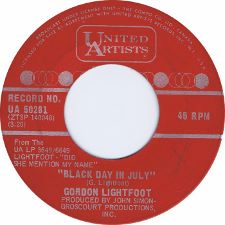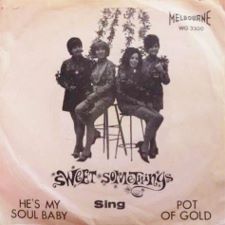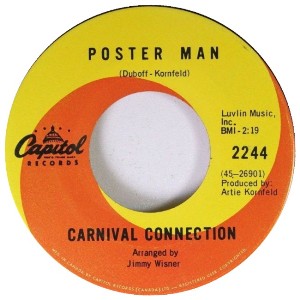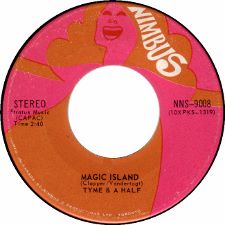| |
Gordon Lightfoot

Black Day in July / Pussywillows, Cat-Tails - 7"
United Artists - 1968
Michael Panontin
|
It was actually more of a black night in July.
The Detroit riots of 1967 were certainly not the first there - the city had previously erupted in the summer of 1943 leaving 34 dead and another 433 wounded - but they were without doubt the most infamous. The story went something like this. After several years of racially motivated violence across the United States, from New York to Los Angeles and places in between, all eyes were on Detroit, the largest and perhaps blackest city still unaffected by the turbulence. Pundits held it up as a model for the rest of America. After all, thanks to the unionized auto factories, Detroit boasted the most robust African-American middle class in the country.
But the feelings of the city's black population towards the predominantly white police force could best be described as distrust, if not outright hatred. And so when officers raided a party at an unlicensed weekend drinking club on 12th Street in the early hours of July 23 - a celebration, as it turns out, feting the return of two local GIs from Vietnam - a crowd gathered on the streets outside and before long all hell broke loose. By the following afternoon, a Sunday, the fires and the looting had spread to other parts of the city. Martha Reeves, singing that night at the Fox Theater asked patrons to leave quietly and stay clear of the trouble outside. Detroit Tiger star Willie Horton, who had grown up near 12th Street, actually went so far as to drive down to the area in his uniform and stand on his car in a futile attempt to convince his fellow Detroiters to stop.
Gordon Lightfoot would have been quite familiar with Detroit, having already made the trip down from Toronto a few times, even performing at The Living End, which was just around the corner from the riot's 12th Street epicentre. Like many Canadians, he most certainly would have seen the news footage of Detroit with tanks and soldiers patrolling the streets, smoke billowing from buildings in various parts of the city, and of course, the eerie footage after things had died down of block after bewildering block burnt to an unrecognizable crisp.
'Black Day in July' was released the following spring when the embers of that horrible day still smouldered in the hearts of Detroiters. It was an uncharacteristic cry of protest from a singer mostly known for wistful ballads and love songs. Lyrically, 'Black Day in July' was potent as hell, with lines like "Motor city madness has touched the countryside / and the people rise in anger / and the streets begin to fill. / And there's gunfire from the rooftops / and the blood begins to spill. / Black day in July". 'Black Day in July' seemed destined to be Lightfoot's first hit south of the border until, that is, another fateful night, this time on March 29, 1968.
"When I first started doing it, a lot of stations were playing it," he explained back then in a CBC radio interview. "What happened was Martin Luther King got assassinated in the middle of all this and I guess it would be too much to play a record like that." For Lightfoot, however, 'Black Day in July' was never meant to be provocative or incendiary. "Ten miles from the riot area, there's a lot of people who don't care at all. Just keep it downtown and don't bother me with it," he said. "When you get in my position, you're singing to a lot of people. You get out and try and do something constructive, you know, about caring."
Today the streets of the Motor City, or the 'D' as it is now called, are desolate and emptied of population, the result of forty years of "white flight" to the suburbs, most certainly exacerbated by those events that hot July night all those years ago. Detroit's contribution to world culture, especially its musical history, is undisputed. Unfortunately, for most people who have never been there, the place is nothing more than a cool brand, or at best an enduring myth. But for the gritty folk who make the city their home, it is more the reality that endures, one that is not always pleasant. Still, the old wounds seem to finally be healing and if you look hard enough, you can almost see that phoenix rising. |
Gordon Lightfoot
|
Suggestions

Sweet Somethings
He's My Soul Baby / Pot of Gold - 7"
Melbourne

Carnival Connection
Poster Man / Alfred Appleby - 7"
Capitol

Tyme and a Half
It's Been a Long Time / Magic Island - 7"
Nimbus

Mock Duck
Do Re Mi / Playing Games - 7"
Baroka
|








